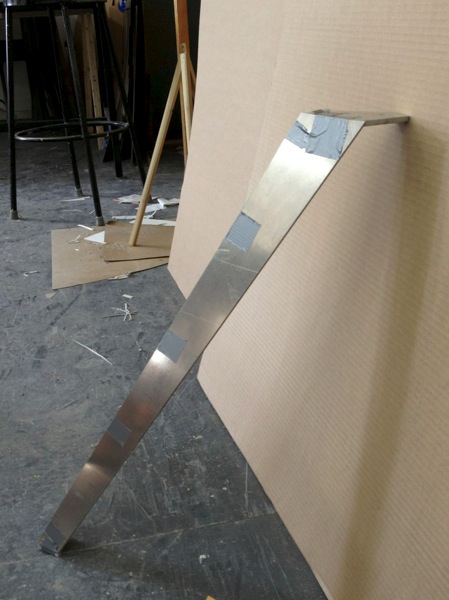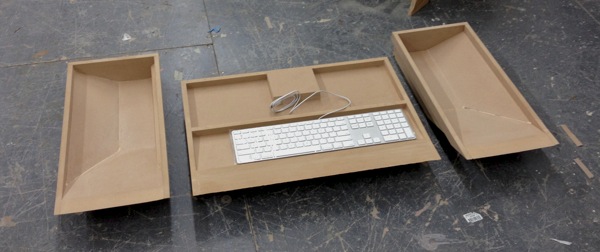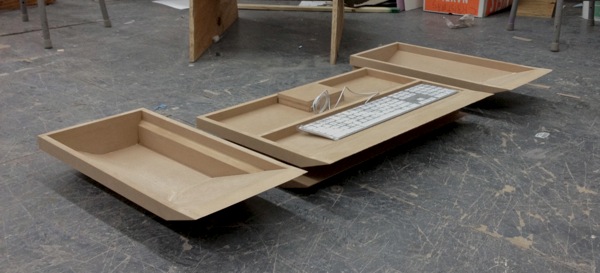All the parts for the Hafele LEDs with Touch Sensor I ordered some time ago have finally arrived. I hope to integrate them into my desk project. Here's the first test run to see that it works.
All the parts for the Hafele LEDs with Touch Sensor I ordered some time ago have finally arrived. I hope to integrate them into my desk project. Here's the first test run to see that it works.



Finally gotten around to making the drawers after spending the last few weeks finding fabricators and refining drawings for fabrication. It's the first time, after starting at Pratt, I will not be making all the parts for a prototype. Needless to say I learned a lot in this process. The metallic parts are being cut with water jet and hopefully they will be ready early this coming week. I'll be taking them to another metal worker for bending and welding. Unfortunately the breaks at school is not wide enough. The aluminum legs will be TIG welded, unfortunately I don't know how to do that yet. The table top was also sourced out because we do not have a large enough planer. The facets are also too difficult to do at school and a large CNC would be much better.
Thanks to a new miter gauge and a digital tilt meter, these drawers were easier than I first though. Though it was still difficult as I'm much more use to having things perpendicular.
Following up on last week's discussion on trash cans, I wondered if the Eames had designed one for their collection. The closest artifact I could find was this:

The Flickr user had attributed it to George Nelson, but the trash can looks very much like it was made from EDU components.
On a side note… I found this:
"This model of Eames arm shell was made by John Wills for Charles and Ray Eames. Charles Eames had brought Wills a craft paper mockup of the chair he wanted to model. Wills told him that the cost of the experimental finished shell would be $25 and that it would be ready in a week or so. Charles Eames returned to the workshop to find that Wills had in fact made two shells. Eames could only afford to pay for one of the shells, leaving this example behind in Wills’ workshop where Wills used it—with a trash can for a base—as his welding perch for fifty years." Marc Greuther, Curator, The Henry Ford
Fiberglass 32 x 23 x 14 in.; diameter: 28 in From the collections of The Henry Ford © Eames Office, LLC
I have been looking for headboards recently and had not realized until now that there are a myriad of headboard designs that uses a wide variety of materials. First up, Apartment Therapy posted in January 10 Headboards one can make for under $50. Cost is definitely the constraint here so these are some very cheap or easy to obtain materials.
Burlap

Pallets

Hankies

Books

Paint

Painted Screen

Cardboard

Salvaged Wood

Ribbons
Framed Photos

And then there are some more in Apartment Therapy archives…
Corrugated Sheet Metal

Natural Wood Headboard

Vinyl Decal

Why do we need headboards? Traditionally, headboards literally hold up one end of the bed off the ground while the foot board holds up the other. As you can see above, there is a shift away from this mere function. Now not only is it decorative, some are also functional in the way that it holds decorations, or books, or general storage for duvets, blankets, sheets etc.
One thought that might be worth mentioning is that I, myself, consider a lack of bed frame somewhat strange and a quick poll with my wife and our family also reached similar results.